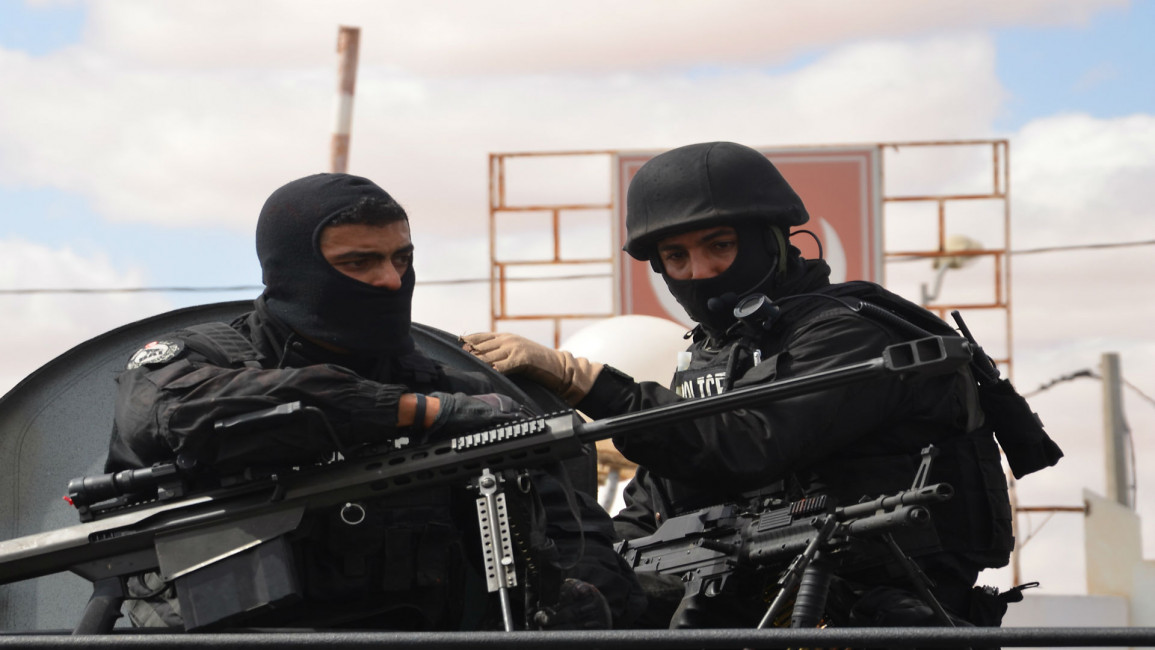Militants planned to establish 'Islamic emirate' in Tunisia
Tunisian Prime Minister Habib Essid said militants who carried out a deadly attack Monday on a town near the Libyan border had planned to establish an Islamic State group (IS) "emirate".
"The purpose of the attack was to disrupt the security situation in our country and establish a Daesh emirate in Ben Guerdane," he said, using an Arabic acronym for IS.
"But thanks to all the efforts, to the cooperation between our national army and our internal security forces, the reaction was strong and fast," said Essid.
Tunisian authorities said in a statement on Monday evening that the death toll in the Ben Guerdane clashes has risen to 53, with 35 extremists and 11 civilians and members of the security forces killed.
Sources within the ministry of interior told The New Arab that the clashes that had started at dawn were still ongoing into Monday night.
"The operation is still ongoing. Security forces and the army are combing the city and its surrounding areas in search of terrorism elements," said an interior ministry source.
Authorities have also seized a large cache of weapons in the houses and the vehicles used by the militants.
Nidaa Tounes, the country's ruling party announced that a member of their local party branch in Ben Guerdane had been killed in Monday's deadly clashes.
Meanwhile, the Tunisian government imposed a curfew on the city of Ben Guerdane and called on residents to obey the "strict" curfew and cooperate with security services as they continue their operation over night.
Militants had launched an attacked on a barracks in Ben Guerdane, near the Libyan border in teh early hours of Monday morning, sparking a huge firefight and security operation.
 |
According to a UN working group on the use of mercenaries, more than 5,000 Tunisians, mostly aged from 18 to 35, have travelled abroad to join militant groups. |  |
It was the second deadly clash in the border area in less than a week, as Tunisia battles a spillover of violence from its neighbour.
Army units were deployed across the town and set up roadblocks on access roads.
Witnesses said troops were using loudhailers to urge residents to stay indoors. The defence ministry appealed for information on any suspect activity.
Last Wednesday, troops killed five militants in a firefight outside the town in which a civilian was also killed and a commander wounded.
Troops have been on alert in the border area following reports that militants had been slipping across since a US air strike on an Islamic State group training camp in Libya on February 18 killed dozens of Tunisian militants.
Tunisia has built a 200-kilometre (125-mile) barrier that stretches about half the length of its border with Libya in an attempt to stop militants infiltrating.
Last month's US strike on the IS training camp outside the Libyan city of Sabratha targeted the suspected mastermind of two of last year's attacks, Noureddine Chouchane.
Washington has said Chouchane was likely among the dozens of militants killed, and that the strike probably averted a mass shooting or similar attack in Tunisia.
Britain announced last week that it was sending a team of around 20 soldiers to Tunisia to train troops patrolling the border with Libya.
Thirty Britons were among 38 foreign holidaymakers killed in a gun and grenade attack on a beach resort near the Tunisian city of Sousse last June.
And last March, gunmen killed 21 tourists and a policeman at the Bardo Museum in Tunis.
According to a UN working group on the use of mercenaries, more than 5,000 Tunisians, mostly aged from 18 to 35, have travelled abroad to join militant groups.
Agencies contributed to this report



